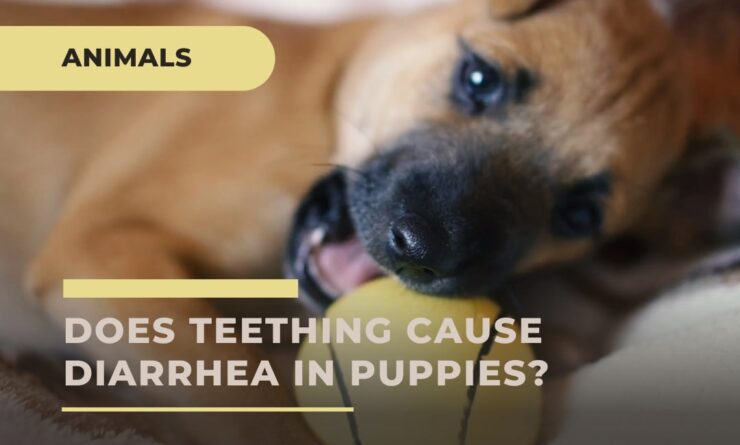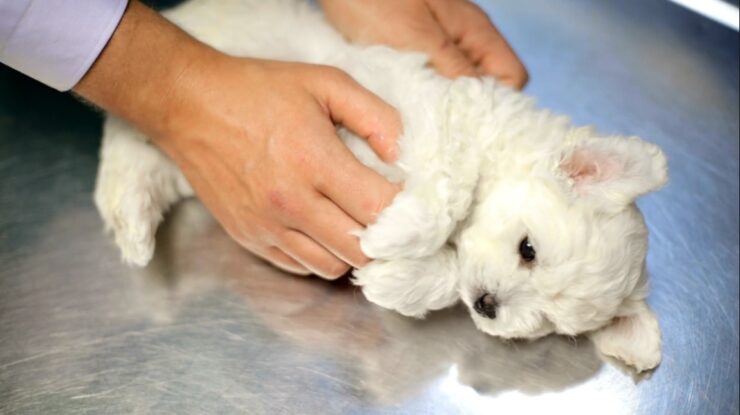Every puppy owner is familiar with the trials and tribulations of teething. It’s a rite of passage for our furry friends, an essential step in their journey to adulthood. However, alongside this period of growth, many owners observe a significant change in their puppy’s bowel movements. It leads us to an intriguing question: Does teething cause tummy troubles in puppies? Let’s unravel the mystery.
Growing
As puppies grow, their baby teeth fall out, making way for the arrival of adult teeth. This process, akin to the human experience of ‘baby teeth,’ typically commences around three months of age. It can be an uncomfortable period for our four-legged companions.
Signs of teething include excessive chewing, drooling, occasional irritability, and, interestingly, a shift in their bowel movements. It is this last symptom that forms the crux of our discussion.
The Puzzle of Pup Tummy Troubles
The journey into puppyhood comes bundled with a myriad of changes, both for the puppy and the owner. One change that raises eyebrows is the noticeable shift in a puppy’s digestive health during their teething phase. This change often manifests as loose stools and an increase in bathroom breaks.
But the question arises: Is this a direct consequence of teething or a coincidental occurrence?
The discomfort associated with teething is well-documented. Puppies, much like human infants, experience a certain degree of pain and restlessness as their adult teeth start to emerge. This discomfort often drives them to chew incessantly, a natural mechanism to soothe their sore gums. Here lies a plausible explanation for the observed tummy troubles. During this chewing frenzy, puppies tend to gnaw on various objects, many of which are not designed for canine consumption. This ingestion of inappropriate items can cause an upset stomach, resulting in loose stools.
The Great Debate: Direct Causation or Mere Correlation?
Drawing a direct line between teething and tummy troubles in puppies is a tempting proposition. However, it’s essential to approach this theory with a degree of caution. The scientific community is still mulling over this debate, and as of now, there is no definitive evidence that directly links teething with digestive issues.
What is certain, however, is that the teething period is a time of physiological stress for puppies. Their immune systems are still maturing, making them more susceptible to a variety of health issues, including those of the digestive tract. This weakened immunity, coupled with the physiological changes associated with teething, creates a complex picture where determining causation becomes challenging.
Other Possible Culprits
While teething might be a contributing factor to tummy troubles, it’s vital not to overlook other potential causes. A puppy’s life is marked by curiosity and exploration, often leading them to investigate their environment orally. This inclination to chew and ingest a range of items, from toys to household objects, can upset their delicate digestive balance.
Moreover, puppies’ dietary needs evolve rapidly as they grow. The transition from mother’s milk to commercial puppy food is a significant dietary shift. This change, while necessary for their development, can sometimes disrupt their digestive system temporarily, leading to loose stools and increased frequency of bowel movements.
In conclusion, the link between teething and tummy troubles in puppies is complex and multifaceted. While teething may play a role, other factors such as dietary changes and indiscriminate eating habits are also likely contributors. As puppy owners, our role is to ensure our little companions navigate this phase of life with as much ease and comfort as possible. A careful observation of their behavior and prompt veterinary consultation can go a long way in ensuring their overall well-being during this crucial growth phase.
it’s also important to keep an eye out for other pet health concerns like allergies, for which there have recently been some innovative solutions.
Navigating the Teething Terrain
As we journey through the nebulous connection between teething and tummy troubles, our focus must remain on the aspects within our control – our response. Since teething can be a challenging period for puppies, our role as responsible pet parents is to provide them with safe and effective ways to navigate this phase.
Safe chewing toys are a valuable tool in your puppy-care arsenal. Not only do they offer relief from the discomfort of emerging teeth, but they also serve as a safe outlet for the puppy’s increased urge to chew. By providing suitable chew toys, we may reduce the chances of puppies resorting to non-digestible items, thereby potentially mitigating tummy troubles.
Furthermore, regular veterinary check-ups play a pivotal role in ensuring your puppy’s health during this critical phase. These visits allow for early detection and treatment of any potential health issues. Remember, preventive care is often the best way to ensure your puppy’s long-term health and well-being.
When to Seek Veterinary Advice
While minor tummy troubles can be a common part of the puppy growth phase, it’s vital to recognize when these issues cross the line from ‘normal’ to ‘concerning.’ An upset stomach, while occasionally expected, should not become a persistent problem.
Severe or continuous symptoms such as vomiting, loss of appetite, lethargy, or a drastic change in bowel movements should serve as red flags. These signs could indicate a more serious issue at play, such as gastrointestinal infection or the ingestion of a harmful object. In such cases, immediate veterinary attention is essential.
A puppy’s behavior and energy levels can also serve as indicators of their health. If your typically playful and energetic pup suddenly becomes lethargic or disinterested in their favorite activities, it’s time to consult a vet.
Lastly, trust your instincts. As a puppy parent, you’re most attuned to your pet’s behavior and habits. If something feels off, it’s better to err on the side of caution and consult with a veterinary professional. After all, ensuring the health and happiness of our furry friends is the ultimate goal!
FAQs
What can I give my puppy to chew on during teething to prevent ingestion of harmful items?
Providing safe chew toys is a great way to manage your puppy’s increased urge to chew during the teething phase. Choose chew toys specifically designed for teething puppies, made from materials that are safe and non-toxic. You can also opt for toys that can be frozen, as the cold can provide additional relief to sore gums. Always supervise your puppy during chew time to ensure they don’t accidentally break off and swallow a piece of the toy.
Are there any dietary supplements to support my puppy’s digestive health during teething?
Probiotics can be beneficial for maintaining a healthy balance of gut bacteria during the teething phase. These can be found in certain puppy foods or can be given as separate supplements. Always consult with your vet before starting any new dietary supplement regimen for your puppy.
Should I adjust my puppy’s diet during teething?
It’s generally not necessary to alter your puppy’s diet during teething unless they show signs of discomfort while eating their usual kibble. If you notice your puppy struggling to eat, you might want to temporarily switch to wet food or soak their dry food in warm water to make it softer. Always ensure the food you’re providing is balanced and appropriate for their age and size.
Can I use over-the-counter teething gels for my teething puppy?
Human teething gels are not recommended for puppies as they may contain ingredients that are unsafe for dogs. If you believe a teething gel could be beneficial, consult with your vet. They may be able to recommend a safe, dog-appropriate product.
How can I tell if my puppy is teething or if the chewing is a behavioral issue?
While both teething and behavioral issues can lead to increased chewing, there are usually other signs present that indicate teething. These might include drooling, swollen gums, and visible loss of baby teeth. If your puppy’s excessive chewing persists beyond the typical teething age (around 6-8 months), it might be a behavioral issue that requires further training or consultation with a professional dog behaviorist.

My puppy seems to be in a lot of discomfort during teething. Is this normal?
While some discomfort is normal during teething, excessive distress is not. If your puppy seems to be in a lot of pain, refuses to eat, or becomes overly aggressive, it’s best to consult with your vet. They can check for any potential complications, like impacted teeth, that may be causing the excess discomfort.
Can teething affect my puppy’s behavior beyond causing an upset stomach?
Teething can indeed affect a puppy’s behavior in other ways. The discomfort can make puppies more irritable or anxious, leading to behavior changes such as increased aggression, excessive whimpering, or a loss of interest in play. Providing adequate comfort measures and maintaining a calm, supportive environment can help your puppy better cope with these temporary changes.
In Conclusion – The Teething-Tummy Trouble Enigma
In the absence of definitive scientific evidence, the link between teething and tummy troubles in puppies remains somewhat of a mystery. While we cannot conclusively state that one causes the other, we can acknowledge that these events often coincide. As responsible caretakers, our role is to ensure our puppies navigate this growth phase with as much comfort and care as possible.
Remember, every pup is unique, and what holds for one might not be the same for another. The key is to observe, understand, and respond to their needs while maintaining open communication with your trusted veterinarian. This way, you can ensure your puppy’s teething journey is as smooth and trouble-free as possible.
















